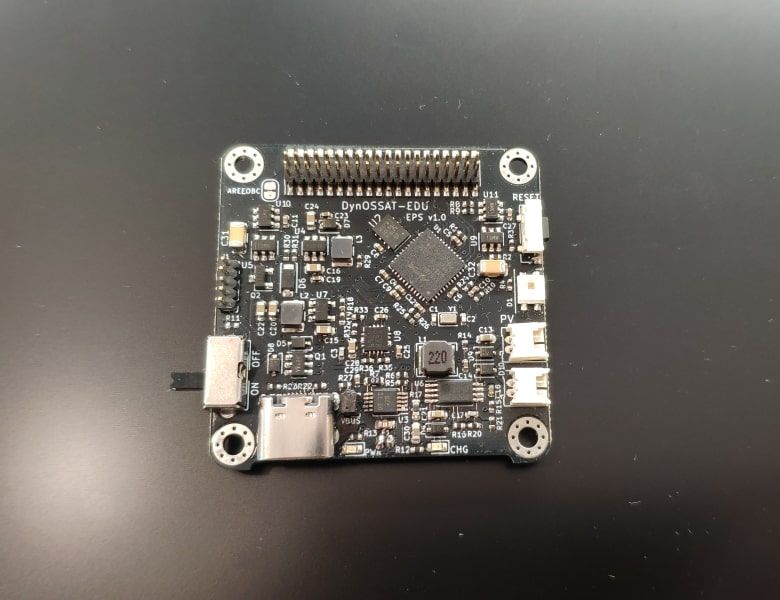
DynOSSAT-EDU EPS by BH Dynamics
DynOSSAT-EDU is the first open source PocketQube educational kit compatible with CircuitPython and Arduino.
This plaform is equipped with all the necessary modules for the operation of a nanosatellite (PocketQube) in Low Earth Orbit (LEO) that would serve as a device for teaching, training, and driving curiosity about the philosophy and technology related to NewSpace.
This is the EPS (Electric Power System), the module responsible for battery management and power distribution subsystems, including charging through solar panels using flight-proven MPPT electronics.
Hardware is licensed under CERN OHL v1.2.
Technical details
- Well-known 48 MHz Cortex-M0 ATSAMD21E18 MCU with 256 KB flash + 32 KB RAM
- 32 Mbit SPI flash for storing CircuitPython code and libraries
- Flight-proven SPV1040 Maximum Power Point Tracking (MPPT) IC for solar cells power management
- Ultra low input voltage L6924D Lithium battery charger management IC optimized for pairing with the SPV1040
- Separate 5V and 3.3V power rails generated through high-performance DC/DC converters
- Battery Current/Voltage/Power measurement through the flight-proven INA226 digital meter
- Back-powering protection and load switching through the TPS22918, member of a flight-proven family of switches
- User-controllable WS2812B addressable RGB LED
- Female USB-C 2.0 connector for power and data logging
- Standard Molex Picoblade 1.5 mm connectors for battery and solar cells
- Connected to the OBC through SPI/I2C/UART for data communication and/or redundancy
- Comes preprogrammed with the UF2 Bootloader and CircuitPython 6.0.0
Documentation
This board is open source hardware. You can check the docs and contribute here.
Purchase
Contribute
Have some info to add for this board? Edit the source for this page here.
CircuitPython 10.1.3
This is the latest stable release of CircuitPython that will work with the DynOSSAT-EDU EPS. Use this release if you are new to CircuitPython.
Modules included in this download
adafruit_pixelbuf analogio array audiobusio audiocore audioio board builtins busdisplay busio busio.SPI busio.UART codeop collections digitalio displayio epaperdisplay errno fontio fourwire i2cdisplaybus locale math microcontroller neopixel_write nvm onewireio os paralleldisplaybus pulseio pwmio rainbowio random rtc storage struct supervisor sys terminalio time usb_cdc usb_hid usb_midi warningsFeatures: USB-C
CircuitPython 10.2.0-alpha.1
This is the latest development release of CircuitPython that will work with the DynOSSAT-EDU EPS.
Alpha development releases are early releases. They are unfinished, are likely to have bugs, and the features they provide may change. Beta releases may have some bugs and unfinished features, but should be suitable for many uses. A Release Candidate (rc) release is considered done and will become the next stable release, assuming no further issues are found.
Please try alpha, beta, and rc releases if you are able. Your testing is invaluable: it helps us uncover and find issues quickly.
Release Notes for 10.2.0-alpha.1
Modules included in this download
adafruit_pixelbuf analogio array audiobusio audiocore audioio board builtins busdisplay busio busio.SPI busio.UART codeop collections digitalio displayio epaperdisplay errno fontio fourwire i2cdisplaybus locale math microcontroller neopixel_write nvm onewireio os paralleldisplaybus pulseio pwmio rainbowio random rtc storage struct supervisor sys terminalio time usb_cdc usb_hid usb_midi warningsFeatures: USB-C
Absolute Newest
Every time we commit new code to CircuitPython we automatically build binaries for each board and language. The binaries are stored on Amazon S3, organized by board, and then by language. These releases are even newer than the development release listed above. Try them if you want the absolute latest and are feeling daring or want to see if a problem has been fixed.
Previous Versions of CircuitPython
All previous releases of CircuitPython are available for download from Amazon S3 through the button below. For very old releases, look in the OLD/ folder for each board. Release notes for each release are available at GitHub button below.
Older releases are useful for testing if you something appears to be broken in a newer release but used to work, or if you have older code that depends on features only available in an older release. Otherwise we recommend using the latest stable release.
